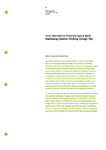‘From Boudieu to Friere - By way of Boal’
| dc.contributor.author | Brown, Robert | |
| dc.contributor.author | Clark, P | |
| dc.date.accessioned | 2022-08-04T15:10:20Z | |
| dc.date.available | 2022-08-04T15:10:20Z | |
| dc.date.issued | 2013-11-01 | |
| dc.identifier.uri | http://hdl.handle.net/10026.1/19493 | |
| dc.description.abstract |
The context of architectural practice today is in a state of enormous flux, with the profession facing considerable challenges, including: increased competition; shifting working contexts; an increasingly complex urban environment; growing environmental concerns; and emerging opportunities outside the profession's traditional boundaries of practice. We need practitioners who are able to think creatively in response to a multiplicity of opportunities and problems. Intrinsic to this demand in a parallel necessity to break out of our inherited modes of behaviour and thinking, and an ability to formulate and implement new forms of practice in response to a highly fluid context. Architectural education has concurrently been called upon to equip future practitioners with the capacity to respond to future challenges and emerging opportunities. In response we will draw upon Bourdieu's construct of habitus to consider how inherited paradigms of design studio education inculcate students into received ways of working and thinking. In opposition, we will posit Boal's theatre forum as a reference for our own conceptualisation of the design studio as a space of play in which creative thinking can be explored and developed. While such pedagogy carries its own risks, play affords a sense of autonomy and efficacy that Friere argues is vital for enabling and pursuing creative thinking in the face of current and emerging challenges. | |
| dc.language.iso | en | |
| dc.title | ‘From Boudieu to Friere - By way of Boal’ | |
| dc.type | journal-article | |
| plymouth.journal | Field | |
| plymouth.organisational-group | /Plymouth | |
| plymouth.organisational-group | /Plymouth/Faculty of Arts, Humanities and Business | |
| plymouth.organisational-group | /Plymouth/Faculty of Arts, Humanities and Business/School of Art, Design and Architecture | |
| plymouth.organisational-group | /Plymouth/REF 2021 Researchers by UoA | |
| plymouth.organisational-group | /Plymouth/REF 2021 Researchers by UoA/UoA13 Architecture, Built Environment and Planning | |
| plymouth.organisational-group | /Plymouth/Users by role | |
| plymouth.organisational-group | /Plymouth/Users by role/Academics | |
| dcterms.dateAccepted | 2012-04-11 | |
| dc.rights.embargoperiod | Not known | |
| rioxxterms.licenseref.uri | http://www.rioxx.net/licenses/all-rights-reserved | |
| rioxxterms.licenseref.startdate | 2013-11-01 | |
| rioxxterms.type | Journal Article/Review |


